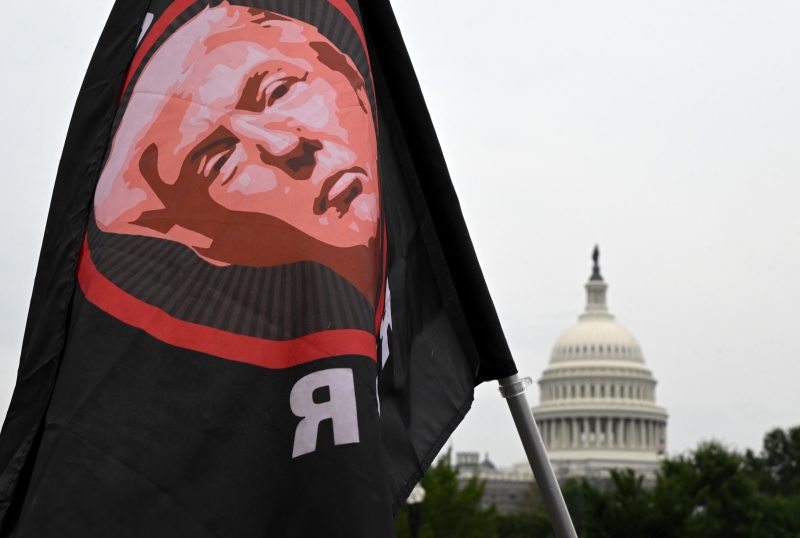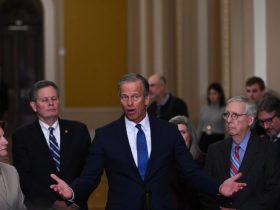The dark imagery invoked by Donald Trump during his brief visit to the nation’s capital last week — “the filth and the decay … broken buildings” — renewed the stereotype of collapsing American cities as a means of calling for his federal indictment to be moved out of the District. It also reignited his hostile relationship with a city he said needed to be taken over by the federal government when he occupied the White House.
Trump rarely ventured out into the District during his four years as president, other than to travel to the downtown hotel that bore his name at the time, and he did not attempt to win the hearts and minds of D.C.’s overwhelmingly Democratic voters through political rallies or meetings with city leaders. He received less than 5.5 percent of D.C.’s popular vote in 2020, and 4 percent in 2016. He and his lawyers cite such numbers in floating the idea of a change of venue for his trial on charges of trying to subvert the 2020 election, as well as his idea for a federal takeover of the District, which he again raised on Truth Social in recent days.
“No way I can get a fair trial, or even close to a fair trial, in Washington, D.C.,” the 77-year-old Florida man who summers in New Jersey said last week. “There are many reasons for this, but just one is that I am calling for a federal takeover of this filthy and crime ridden embarrassment to our nation.”
The former president also falsely claimed that homicides in D.C. “just shattered the all-time record” and “other violent crimes have never been worse.”
D.C.’s downtown is still rebounding from the pandemic, and it has been a violent year in the city. August has so far been a particularly brutal month for killings, and the homicide total this year is on pace to top last year’s total of 203. Council member Trayon White Sr. (D-Ward 8), while not directly addressing Trump’s statements, said this week that the National Guard was needed to reduce crime.
“Desperate times call for desperate measures,” he said.
But Trump’s claim of a record being shattered is untrue. D.C. recorded at least 360 homicides every year from 1988 to 1996 — far above the current pace, at a time when the city had a smaller population.
Judges in the D.C. federal court, and federal legal precedent dating to the Watergate prosecutions of the 1970s, have weighed strongly against changing venues, both locally and across the country. And longtime city residents say the former president is just wrong about D.C.
For Trump’s first appearance in federal court last week, he flew from New Jersey to Reagan National Airport. He then rode up the tree-lined George Washington Memorial Parkway, over the 14th Street Bridge, where he would have seen the reinvigorated waterfront and Wharf development, then through the Third Street Tunnel, leading him almost directly to the federal courthouse.
“It was also very sad driving through Washington, D.C.,” Trump told reporters upon his return to the airport, “and seeing the filth and the decay and all of the broken buildings and walls and the graffiti.”
“It looks like he spent most of his time in a tunnel,” responded Del. Eleanor Holmes Norton (D-D.C.). “A tunnel isn’t the best way to see D.C. I take real umbrage as to the work I’ve done on the Wharf. I’d like to invite him to see the real D.C. I can’t imagine what he’s talking about. The city’s doing very well.”
Chef José Andrés, who refused to open a restaurant in Trump’s former Pennsylvania Avenue hotel, said, “Washington, D.C. is a beautiful city that needs nobody to defend its good name from ignorant smears. I know that Mr. Trump likes to live in gold-plated towers, but if he stepped out of his bubble he would see that Washington D.C. is no different from other cities in this amazing country. It’s full of hard-working people trying to look after their families and build better neighborhoods for their children.”
Andres noted that he and his wife moved to the District 30 years ago. “When we first came to D.C., some people thought the downtown was broken forever,” Andres said. “They were wrong then, and Mr. Trump is wrong now.”
D.C. Council member Brooke Pinto (D-Ward 2) said that Trump’s comments “underscore how critical it is that the District achieve full and complete statehood.” She noted that, unlike any other state, D.C. “is beholden to the federal government to approve local legislation, including its budget, and appoint judges to our courts. In no other state could a criminal defendant and presidential candidate plausibly threaten a federal takeover as retribution for his prosecution — prosecution that is pursued by federally appointed attorneys. Yet, that is the case in the District until we achieve statehood.”
As president in 2020, Trump floated the idea of taking control of the D.C. Police Department during the demonstrations and vandalism that followed the police murder of George Floyd in Minnesota. Ultimately the federal government did not take such steps but did use its broad powers over the District to send the National Guard onto the streets, along with military helicopters that flew over the city and menaced demonstrators.
Though D.C. has its own mayor and council, it is not a state, and the federal government plays an outsize role in its affairs. Congress can block local legislation, as lawmakers of both parties did when the city recently attempted to overhaul its criminal code. Crimes of adults such as murder, rape and robbery are prosecuted by the presidentially appointed U.S. attorney, rather than a locally elected or appointed prosecutor.
Mayor Muriel E. Bowser (D) and D.C. Attorney General Brian L. Schwalb (D) declined to comment. But Council Chairman Phil Mendelson (D) called Trump’s comments “a cheap shot, not based on fact,” and said any graffiti the ex-president saw wouldn’t have been new. Council member Zachary Parker (D-Ward 5) said, “It’s unfortunate that the twice-impeached, three-time indicted former president would take cheap shots at the city.”
The decision on whether to move Trump’s trial on charges that he conspired to obstruct the 2020 election will come down to federal judges, starting with U.S. District Judge Tanya S. Chutkan, and then possibly the Court of Appeals for the D.C. Circuit and then the U.S. Supreme Court.
At least a dozen Jan. 6, 2021, defendants requested that their trials be moved out of D.C., citing the prejudicial impact on jurors of both media coverage of the Capitol riot and the investigation of the House Select Committee, which held televised hearings on the insurrection. All such motions were rejected. The practice in federal court has been to try to pick a jury first, and only if the voir dire process fails to produce a fair jury does the judge then consider the change of venue motion.
The legal affairs publication Lawfare noted that at least 11 judges on the D.C. federal bench have denied such motions in 15 rulings related to Jan. 6 cases. In one motion before the first Oath Keepers trial, a defense lawyer argued that “the Court can take judicial notice that, with few exceptions, potential District jurors loathe Donald Trump and, by extension, his supporters. The antipathy towards Trump and his supporters in the District is obvious.”
But the D.C. judges have rejected that argument, and the pretrial publicity argument, in part by citing the D.C. circuit appeals court’s ruling in the case of H.R. Haldeman, a top aide to President Richard M. Nixon who wanted his trial moved out of the District. The court said in 1976 it would be incorrect for lawyers, or judges, to presume a juror’s political views will prevent them from fairly analyzing the evidence in a courtroom.
In one recent Jan. 6 case, a D.C. judge wrote that “Defendant’s assumptions concerning party affiliation in the District are not an appropriate basis for changing venue. Jurors’ political leanings are not, by themselves, evidence that those jurors cannot fairly and impartially consider the evidence presented and apply the law as instructed by the court.”
That judge was Chutkan, who will preside over Trump’s case.
Samantha Latson contributed to this report.








